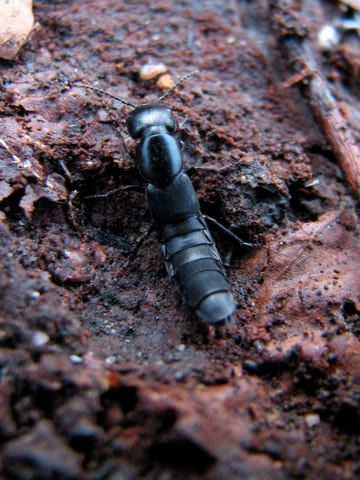365 Urban species. #323: Devil's Coach Horse

Photo by cottonmanifesto. Location: Olmsted Park.
Urban species #323: Devil's coach horse Staphylinus olens
First, I must confess to another tentative and perhaps dubious identification. In my defense, there are more named species of insects than any other life form, more species of beetles than any other insect, and in North America, more species of rove beetles than any other beetle family. That being said, this creature looks very much to me like a devil's coach horse, a European rove beetle widely introduced to gardens and yards around the world.
You might think that underneath a log is nice safe place for detritus-feeding animals, peacefully grazing on rot-softened organic matter. But the maggots, earthworms, and woodlice are preyed upon by the devil's coach horse. With powerful mandibles that can deliver a painful bite to a human finger, they chop up their invertebrate prey into chunks. The devil's coach horse is among the largest of the rove beetles, and even feed on other predatory animals, such as the woodlouse spider.
Rove beetles are distinguished by their very short wings, which make them look rather un-beetlelike. Rove beetles' incomplete wing covers (called "elytra") don't cover their abdomens, causing them to be sometimes confused with earwigs. Devil's coach horse beetles bend their abdomens when disturbed, much as earwigs do, but they also emit a foul-smelling fluid. This behavior has earned them the alternate common name "cocktail." I think "devil's coach horse" sounds cooler.